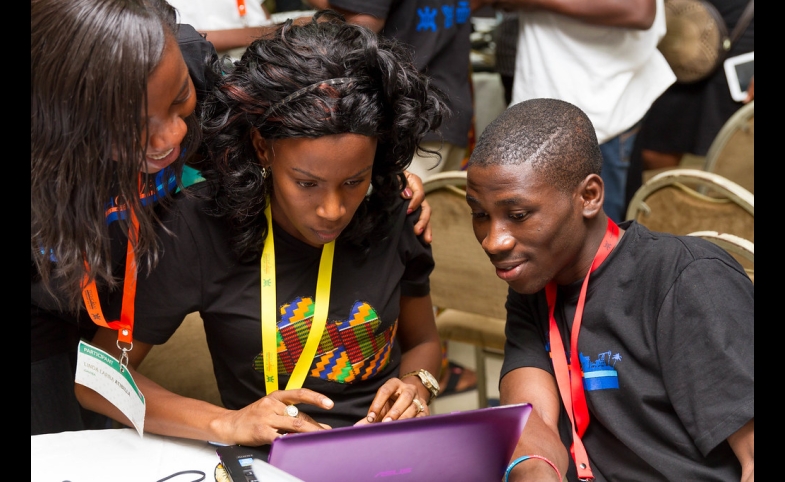CPD and The Black Policy Institute hosted an online conversation focusing on the impact of technology in Africa, with a deep dive into data sovereignty and policy implications. This session compared the...
KEEP READINGThe CPD Blog is intended to stimulate dialog among scholars and practitioners from around the world in the public diplomacy sphere. The opinions represented here are the authors' own and do not necessarily reflect CPD's views. For blogger guidelines, click here.

The Future of AI in Africa: Designing an Ethical Rollout of AI-Powered Tech on the Continent
“Data is the oil for our generation,” said software engineer Jabar Lantam in a recent discussion co-hosted by The Black Policy Institute and the USC Center on Public Diplomacy. Lantam and fellow panelists pointed to the need for new laws and practices that safeguard data sovereignty and ensure an ethical rollout of artificial intelligence (AI) in Africa.
There is growing interest in AI across Africa, with its booming population and rapid growth in AI investments. Already, entrepreneurs and corporations are deploying AI on the continent to promote economic empowerment and address local challenges. In Nigeria, AI technology is being used to screen tuberculosis cases. In Cape Town, a startup is digitizing and translating African languages using AI-powered software. Across Africa, Google’s AI-powered tools are being used to forecast floods, predict locusts, improve ultrasound technology, and increase child literacy.
But there are hurdles facing African AI entrepreneurs, said Ayomide Owoyemi, a researcher in health informatics at the University of Illinois. “A lot of the people who are pushing the boundaries of AI are doing so from abroad,” he said. Compared to Western countries, according to Owoyemi, Africa lacks the high-tech infrastructure for AI, particularly access to high-quality data.
Owoyemi said that much of the AI deployed in Africa relies on data that is not from the continent. For the average AI-entrepreneur, according to Owoyemi, data is too expensive. “One of the things we need to solve is access to data,” he said. He pointed to a need for data curation projects across the continent that enable data access for free, with limitations to ensure ethical and responsible use.
This “community driven approach” can drive economic growth, create jobs and empower communities, all while creating more inclusive technologies that address the needs of diverse populations.
As AI rolls out in Africa, business consultant and speaker Busie Matsiko said African entrepreneurs must be mindful to protect their intellectual property. “Sometimes, you think you’re just volunteering, but you’re actually the talent,” Matsiko said. “How do you protect the talent and make sure these partnerships and collaborations are intentional and a win-win for everyone involved?”
Matsiko also urged expanded training and education related to AI. “At a grassroots level, it’s about empowering locals on what AI is [and] what these technologies mean,” Matsiko said. She added that careers like “data scientist” should be promoted as a viable option to young Africans.
David Ifeoluwa Adelani, a fellow at University College London who focuses on adaptation of AI technologies for local languages, said it is crucial to invest in education and training programs to build local AI expertise and prevent brain drain by providing opportunities for African talents to innovate within their communities. “As you train people, they disappear,” said Adelani, referencing a current exodus of software engineers from Africa. He suggested a system, similar to India’s, where training occurs on a massive scale. “We have to improve our educational system to train a lot of talent,” said Adelani. “We can provide enough talent for ourselves and others, just because of our [large] population.”
To collect the vast quantities of data needed for AI tools, Adelani cited the need for “participatory research,” locating African communities that own data—such as local language texts—and collaborating with them on developing AI tools. This “community driven approach,” according to Adelani, can drive economic growth, create jobs and empower communities, all while creating more inclusive technologies that address the needs of diverse populations.
Matsiko agreed that AI practices and policies must consider the socioeconomic realities of African countries including basic necessities such as healthcare, clean water, and education. “What is important to [African countries] is different to what’s of interest to the Western world,” said Matsiko.
Visit CPD's Online Library
Explore CPD's vast online database featuring the latest books, articles, speeches and information on international organizations dedicated to public diplomacy.
POPULAR ARTICLES
-
January 29
-
January 20
-
December 17
-
January 28
-
January 2
Join the Conversation
Interested in contributing to the CPD Blog? We welcome your posts. Read our guidelines and find out how you can submit blogs and photo essays >.













